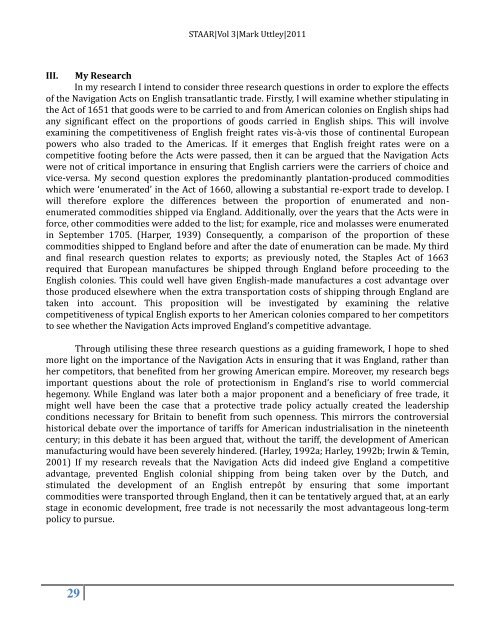STAAR Volume 3 - St. Anne's MCR
STAAR Volume 3 - St. Anne's MCR
STAAR Volume 3 - St. Anne's MCR
Create successful ePaper yourself
Turn your PDF publications into a flip-book with our unique Google optimized e-Paper software.
29<br />
<strong>STAAR</strong>|Vol 3|Mark Uttley|2011<br />
III. My Research<br />
In my research I intend to consider three research questions in order to explore the effects<br />
of the Navigation Acts on English transatlantic trade. Firstly, I will examine whether stipulating in<br />
the Act of 1651 that goods were to be carried to and from American colonies on English ships had<br />
any significant effect on the proportions of goods carried in English ships. This will involve<br />
examining the competitiveness of English freight rates vis-à-vis those of continental European<br />
powers who also traded to the Americas. If it emerges that English freight rates were on a<br />
competitive footing before the Acts were passed, then it can be argued that the Navigation Acts<br />
were not of critical importance in ensuring that English carriers were the carriers of choice and<br />
vice-versa. My second question explores the predominantly plantation-produced commodities<br />
which were ‘enumerated’ in the Act of 1660, allowing a substantial re-export trade to develop. I<br />
will therefore explore the differences between the proportion of enumerated and nonenumerated<br />
commodities shipped via England. Additionally, over the years that the Acts were in<br />
force, other commodities were added to the list; for example, rice and molasses were enumerated<br />
in September 1705. (Harper, 1939) Consequently, a comparison of the proportion of these<br />
commodities shipped to England before and after the date of enumeration can be made. My third<br />
and final research question relates to exports; as previously noted, the <strong>St</strong>aples Act of 1663<br />
required that European manufactures be shipped through England before proceeding to the<br />
English colonies. This could well have given English-made manufactures a cost advantage over<br />
those produced elsewhere when the extra transportation costs of shipping through England are<br />
taken into account. This proposition will be investigated by examining the relative<br />
competitiveness of typical English exports to her American colonies compared to her competitors<br />
to see whether the Navigation Acts improved England’s competitive advantage.<br />
Through utilising these three research questions as a guiding framework, I hope to shed<br />
more light on the importance of the Navigation Acts in ensuring that it was England, rather than<br />
her competitors, that benefited from her growing American empire. Moreover, my research begs<br />
important questions about the role of protectionism in England’s rise to world commercial<br />
hegemony. While England was later both a major proponent and a beneficiary of free trade, it<br />
might well have been the case that a protective trade policy actually created the leadership<br />
conditions necessary for Britain to benefit from such openness. This mirrors the controversial<br />
historical debate over the importance of tariffs for American industrialisation in the nineteenth<br />
century; in this debate it has been argued that, without the tariff, the development of American<br />
manufacturing would have been severely hindered. (Harley, 1992a; Harley, 1992b; Irwin & Temin,<br />
2001) If my research reveals that the Navigation Acts did indeed give England a competitive<br />
advantage, prevented English colonial shipping from being taken over by the Dutch, and<br />
stimulated the development of an English entrepôt by ensuring that some important<br />
commodities were transported through England, then it can be tentatively argued that, at an early<br />
stage in economic development, free trade is not necessarily the most advantageous long-term<br />
policy to pursue.



